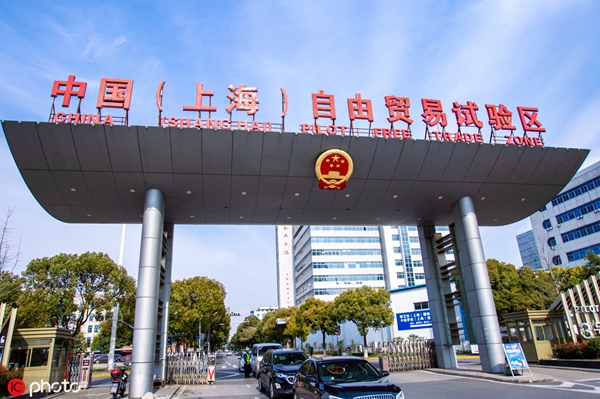Shanghai FTZ pushes for more innovative measures

The China (Shanghai) Pilot Free Trade Zone. [Photo/IC]
The China (Shanghai) Pilot Free Trade Zone (FTZ)has been a pioneer in making reforms since it was established more than five years ago.
As the overall plan for the new areas of the free trade zone is pushed forward, it is expected to become a new hub for deepening financial reform and innovation in Shanghai and the whole country.
"The new areas were established on the basis of the free trade zone's development in the past five years. It will become a special and more open economic zone. We need to push for more effective open measures and carry out greater risk stress testing to explore the free payment of cross-border funds in advance," said Zheng Yang, head of Shanghai municipal finance services office.
He noted that since the country promoted high-level opening up policies, Shanghai has submitted three batches of 31 financial opening up projects to the State Council and the national financial management department. Currently, a total of 17 projects have been approved, and the fourth batch of projects is being prepared to be reported.
In the next stage of its innovative development, Shanghai FTZ will focus on the national strategy of the integration of the Yangtze River Delta region.
Recently, at the first High-level Forum on the Integrated Development of the Yangtze River Delta, Zhou Hanmin, vice-chairman of the CPPCC Shanghai Committee, said in a keynote speech that the future construction of the new areas of the Shanghai FTZ should be in line with the national strategy. He also emphasized the importance of the far-reaching effects of the free trade zone.
Free trade zones across the country have made full efforts in exploring innovative measures.
As the youngest free trade zone in China, the China (Hainan) Pilot Free Trade Zone has taken the lead in piloting the construction of a free trade port and is accelerating institutional innovation. It strives to achieve substantive breakthroughs from developing from a "zone" to a "port" in the next two to three years.
Of the 12 pilot projects already launched by the Hainan FTZ, six have completed phased tasks and the others are actively advancing. In the future, it will add six new pilot projects, including the promotion of 5G network deployment and commercialization on the island province, as well as the establishment of the China (Hainan) International Intellectual Property Exchange.
The pace of innovation in inland free trade zones is also accelerating. For example, the China (Henan) Pilot Free Trade Zone is preparing to introduce new measures for deepening reform and innovation by launching upgraded versions of polices covering government affairs, supervision, law, finance, and multimodal transport.
A number of reform and innovation measures with more international standards and more practice values are expected to be launched.
In addition, the Standing Committee of the Sichuan Provincial People's Congress recently passed the China (Sichuan) Pilot Free Trade Zone Regulations. The Hubei provincial government has delegated 35 items of provincial economic and social management authority to the China (Hubei) Pilot Free Trade Zone.
The China (Fujian) Pilot Free Trade Zone recently launched a new batch of 39 innovative measures. The Tianjin Dongjiang Bonded Area completed the nation's first integrated finance leasing and car export business.
 Contact Us
Contact Us

 Brilliant light show to illuminate Huangpu River
Brilliant light show to illuminate Huangpu River Maple leaves paint splendid scenery in Pudong
Maple leaves paint splendid scenery in Pudong Appreciate alluring lotus blossoms in Pudong's Century Park
Appreciate alluring lotus blossoms in Pudong's Century Park New pedestrian street boosts Pudong's night economy
New pedestrian street boosts Pudong's night economy 


